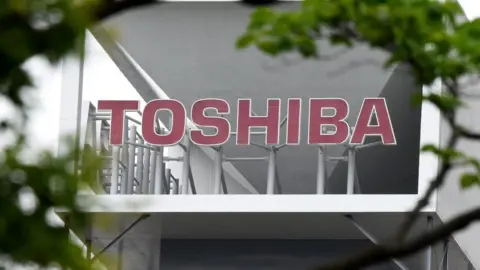Toshiba to sell chip unit for $18bn to plug losses
 Getty Images
Getty ImagesToshiba has sold its prized semiconductor business to a group led by US private equity firm Bain Capital in a bid to keep its struggling business afloat.
The $18bn (£13.3bn) deal is designed to cover billions of dollars of losses incurred in Toshiba's US nuclear unit.
The Japanese firm was almost delisted this year after delaying the publication of its financial results.
It said the deal, if approved, would ensure it remained public.
Toshiba is the world's number two chipmaker and its Toshiba Memory unit accounts for about a quarter of its revenue.
Bain Capital has partnered with South Korea's SK Hynix Inc and brought in US buyers of Toshiba chips such as Apple and Dell in order to buy the division.
However, there is uncertainty over whether rival bidder Western Digital will walk away from the deal amicably.
The data storage firm - which runs a joint venture with Toshiba in the US - was tipped as favourite to buy the business as recently as this week.
"We are disappointed that Toshiba would take this action despite Western Digital's tireless efforts to reach a resolution that is in the best interests of all stakeholders," the company said in a statement on Wednesday.
It has previously taken legal action against Toshiba, arguing that the deal cannot happen without its consent.
On Wednesday Western Digital launched its latest legal attack against its joint-venture partner. The firm filed new arbitration requests against Toshiba for moving to invest in a flash memory production line without its help.
Plugging losses
Toshiba has been under pressure to clinch a deal in order to order to shore up its balance sheet by the end of its financial year next March.
In a statement, it said the sale of Toshiba Memory would boost its finances by 740bn yen (£5bn) after taxes. That would pull it out of negative shareholder equity, key to ensuring it remains a listed entity.
The firm has incurred billions of dollars of losses at its US nuclear unit Westinghouse, which filed for bankruptcy in March.
The business, bought in 2006, had suffered years of cost overruns at its reactors and a downturn in global demand for nuclear energy.
The problems led Toshiba to delay the release of its financial results in May, as it struggled to secure sign-off from its auditors.
It finally published them in August, reporting heavy losses of $8.8bn for the last financial year.
